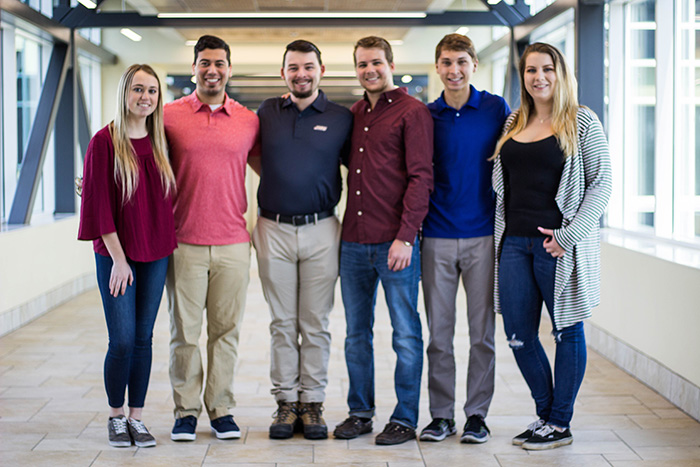University Course Helps 'Build the Bench' of Future Government Leaders

The U.S. Army Medical Materiel Agency is leveraging a 10-week university-based program called "Hacking 4 Defense" that not only gives students a chance to tackle some of the government's biggest problems, but also serves as a way to build interest in future military or civil service.
Maj. Amanda Love, USAMMA's nurse consultant and project manager for the Medical Device Assemblage Management Program Management Office, sponsored a team of six students from James Madison University to improve tracking for Army-fielded medical devices, specifically patient movement items such as ventilators, infusion pumps and vital signs monitors. Love explained that medical device accountability is crucial in battlefield care.
"Every second counts when you are providing trauma care on and off a battlefield," said Love. "If we don't know where the equipment is, it can slow teams down."
Love's team, self-named "Squared Away," developed several potential solutions including a process to standardize the check-in and check-out process of medical equipment in order to encourage accountability and tracking of the devices while in the field, as they move between units and locations. The team also proposed the Army to consider using radio-frequency identification (RFID) tags on medical devices, as well as RFID scanners in the door frames of the Army tents, to track devices as they enter field units. These tags would automatically register to a database that could then communicate with existing databases used by the Army, so that all units could access the information.
"We created our own sample database to demonstrate how the process would work. This solution created a hands-off means of tracking medical equipment without adding extra work or responsibilities to Army personnel. It could also work with existing technology and equipment and create a third party database that was accessible to all units of the Army regardless of their database of choice," explained Squared Away team member Melissa Toman, a 21-year-old James Madison University student majoring in Intelligence Analysis and International Affairs.
Toman and fellow students Kaitlyn Goudey, Hunter Olson, Adam Pinegar, Matt Whitacre and Jaron Martinez interviewed more than 55 subject matter experts, including Army leadership, medical personnel and data analysts. Through their interviews and research, they learned that RFID tracking of medical devices isn't a new concept – in fact, it is already in military treatment facilities and civilian hospitals. However, implementing this technology in an operational environment would present unique challenges, such as retrofitting existing tents and working within government security restrictions for data transmission, which require further analysis.
"We don't expect a final solution at the end of the project; we are not expecting to get something we can implement tomorrow," said Love. "Our goal is to generate thoughtful discussion. In many cases, because these students don't come to the table with a great deal of experience in the military or government, they approach the problems differently. Their creativity helps us see our problems differently, which generates forward momentum toward the best solution."
Squared Away is the second H4D team that Love has sponsored. In 2017, Love worked with a team of students from Stanford University, where H4D started in 2016, to address bottlenecks in casualty care triage using novel technology – specifically, wearable sensors. As with her last team, she said she is continually impressed with the level of creativity, intelligence and professionalism demonstrated by these students.
"Hacking 4 Defense is a great way to examine our big problems and get different perspectives on solutions," said Love, "But more importantly than even that, this program is a way to help us build our bench and, hopefully, recruit the best and brightest to join us on the mission."
Toman added, "I am definitely more interested in working for the government after participating in this class. It has always been a goal of mine to work for the government, but through this experience I have been exposed to different branches and career paths that I can explore in the future."
USAMMA is a subordinate agency of the U.S. Army Medical Research and Materiel Command, which is the Army's main medical materiel developer. The USAMMA's mission is to develop, tailor, deliver and sustain medical materiel capabilities and data in order to build and enable health readiness.
 An official website of the United States government
An official website of the United States government
 ) or https:// means you've safely connected to the .mil website. Share sensitive information only on official, secure websites.
) or https:// means you've safely connected to the .mil website. Share sensitive information only on official, secure websites.


